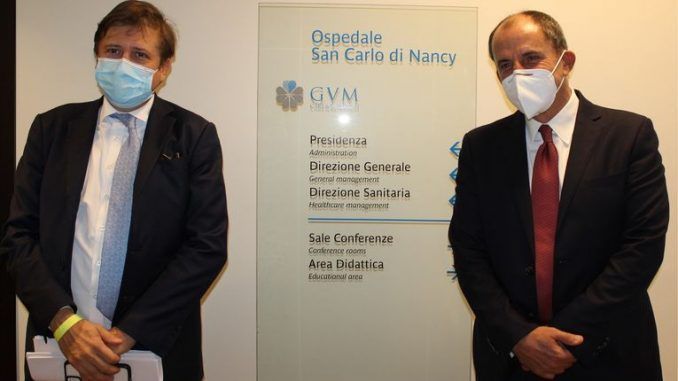San Carlo di Nancy Hospital, obesity: the experience of the team of prof. Gentileschi
Pierpaolo Sileri, Deputy Minister of Health, presented the new Center for Bariatric Surgery today, Monday, Oct. 5, at a web congress featuring top experts in laparoscopic bariatric surgery
According to the World Health Organization
More than 1.5 billion adults over 20 are overweight or obese, according to the World Health Organization. In Italy in particular, obesity is a phenomenon that has been growing steadily in recent years: According to Istat, 36.6 percent of Italians are overweight and 10.6 percent are obese, with a prevalence in the male population (overweight males 45.6% and females 28.1%; obesity males 11.6% and females 9.5%). Lazio ranks third among Italian regions with the highest number of overweight or obese individuals, a condition associated in most cases with type 2 diabetes (WHO Data 2019).
L’San Carlo di Nancy Hospital, Roman reference hospital for minimally invasive surgery, implements its services thanks to the experience of a team specialized in the treatment of severe obesity with the new Department of Bariatric and Metabolic Surgery, coordinated by Professor Paolo Gentileschi, Already a university lecturer at the School of Specialization in General Surgery at the University of Rome Tor Vergata and a founding member of the LAP Group Roma, Gruppo Laparoscopico Romano, a scientific association made up of representatives of all Roman hospitals with expertise in minimally invasive surgery. Prof. Gentileschi is also a member of the Board of Directors of SICOB (Italian Society of Surgery of Obesity and Metabolic Diseases) and has more than 3,000 laparoscopic bariatric surgery procedures to his credit.
L’multidisciplinary approach
L’multidisciplinary approach distinguishes the activities of the team, which sees the integrated collaboration of specialists in Bariatric Surgery, Nutrition, Dietetics, Endocrinology e Psychiatry.
“With a highly specialized team, boasting more than 20 years of know-how and experience in the treatment of metabolic diseases, we are fielding “tailor-made” bariatric surgery” – explains the prof. Gentileschi -, or tailored to the patient. This is because each case must be studied and approached in a unique. Here at St. Charles de Nancy we will apply all modern operative methods, selected on a case-by-case basis, but in particular the Most performed procedures will be sleeve gastrectomy and gastric bypass. These surgeries make up 80 percent of bariatric procedures performed laparoscopically and therefore minimally invasive; are the two most frequently used procedures in the world as they guarantee clinical efficacy and absence of serious nutritional disorders.
Both are associated with good quality of life and low rates of recurrence (weight regain)”.
To present the Center for Bariatric Surgery
To present the Center for Bariatric Surgery and Treatment of Obesity is Deputy Health Minister Pierpaolo Sileri at an online workshop devoted to laparoscopic bariatric surgery.
“The problem of obesity has long been neglected over the years – stated the Deputy Minister Pierpaolo Sileri -. We are talking about 24 thousand surgeries done compared to millions of people with obesity in Italy. Much has been done in the past years on prevention, but much still needs to be done, including on the surgical’approach. Obesity surgery is difficult from a technical point of view but also from the point of view of comorbidities and should be done only in centers with high volumes and equipped with teams capable of dealing with the treatment. We should fund training and research – Sileri stressed -, I hope to act on this in the coming months. We intend to set up a table at the ministry that will evaluate the surgical aspect’s.
More needs to be done to improve the quality of life of people with obesity, we need to invest in health today an investment that will translate tomorrow into savings on treatment and care for those with obesity”.
Today, Monday, Oct. 5, St. Charles de Nancy Hospital is the scene of a web congress, under the coordination of prof. Gentileschi, which sees the participation of the most authoritative voices in the field of Italian Bariatric Surgery, including members of the SICOB board of directors sponsoring the web congress. Subject of the discussions among the specialists are the live surgery of laparoscopic bariatric surgery: 6 operations from the Roman hospital and 6 from as many centers throughout Italy.
The congress thus focuses on laparoscopic bariatric surgery, which adopts a minimally invasive approach via cannula access on the abdomen only with small incisions. This method allows undisputed advantages for the patient, who experiences a mild operative course and a short hospital stay, 1 or 2 days. “These surgeries change people’s lives, transforming the obese patient into a normal-weight patient who can embark on a healthy life course, can live longer, can recover from any comorbidities and even stop taking certain medications.”, comments prof.
Gentileschi.
The obese patient’s journey at San Carlo di Nancy Hospital
Patients referred to San Carlo di Nancy Hospital are placed on a diagnostic pathway, including interviews and visits with Psychiatrist, Nutritionist, Endocrinologist and leading to intervention if there is an indication to proceed with surgery.
The multidisciplinary team completes the preoperative evaluation through imaging and endoscopic examinations: each patient before surgery must be thoroughly evaluated by the specialists in order to direct him or her toward a therapy designed both respecting his or her wishes and his or her pathology, so that he or she can embark on a course with an achievable goal in health.
The patient undergoing bariatric surgery requires a postoperative course particular but, thanks to the minimally invasive approach, this brings little discomfort: in fact, the patient is discharged in the second day, starts drinking and stands up in the first day. They are in fact implemented intra- and post-operative protocols acts to minimize discomfort and pain: the short-cycle surgery allows the patient to undergo surgery and in a few days return to normalcy.
As for the follow up, discharged patient is followed by the surgeon in the initial phase, to manage any surgical issues, and by the nutritionist and endocrinologist in the subsequent phase. This is because weight loss can be achieved without particular difficulty or the patient may have vitamin deficiencies or nutritional issues. The referral center therefore continues to follow him: i best results are found in those patients who slavishly follow the indications of the specialist team and undergo periodic checkups on time; patients who have surgery and instead do not continue with follow-up visits have greater difficulty in obtaining results and achieving their goals, risking failure of the therapeutic weight loss course.
Regular postoperative follow-up should last at least 10 years, a period in which the patient learns a new lifestyle. Therefore, the course of treatment for severe obesity must be as thorough as possible, both pre- and post-operatively.



